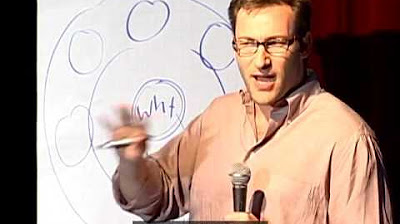The mind-bending physics of time | Sean Carroll
Summary
TLDRこのスクリプトは、時間とエントロピーの概念に焦点を当てています。時間は、日常会話や宇宙の出来事の区別に欠かせない要素であり、過去、現在、未来の異なる時間的概念の違いや、なぜ私たちは過去を記憶できるのに対し、未来は記憶できないかについて探求します。また、エントロピーの増加と複雑な構造の存在との関係についても議論し、宇宙がどのようにして現在の状態に至ったか、そして複雑な生命が存在する理由について考えます。
Takeaways
- 🕒「時間」は英語で最も使われている名詞であり、私たちの日常生活には不可欠です。
- 🌌 時間は宇宙の異なるイベントに帖られたラベルであり、私たちが異なる瞬間を区別するのに役立ちます。
- 🤔 時間について話すときに生じる本質的な問題は、過去、現在、未来の違いや、私たちがどのようにそれらを経験するのかということに関連します。
- 🚀 物理学の理論では、過去と未来を区別しないことがわかります。しかし、私たちの日常経験では、それは明らかな違いがあります。
- 🌟 空間には特別な方向がないように、時間にも特別な「矢」がないという考え方があります。
- 🌍 地球上で空間の矢が存在するのは、地球のような大きな物体の近くに住んでいるからです。同様に、時間の矢も、私たちがビッグバンという大きな出来事の後遺症の影響を受けているから存在します。
- 🔄 entropie(エントロピー)は、システムがどの程度混乱しているかを示す指標であり、宇宙は自然に低いエントロピーから高いエントロピーへと進化しています。
- ⏳ 「第二の熱力学法則」は、システムが低いエントロピーから高いエントロピーへと進化する傾向があることを示しています。
- 🤯 ビッグバン以来、宇宙のエントロピーが増加していることが、私たちの宇宙の全ての出来事を説明できます。
- 🌿 生命や複雑な構造が存在することは、エントロピーが増加しているおかげであり、これが無ければ何も起こらない「熱平衡」の状態に陥り、非常に退屈な宇宙になるでしょう。
- 🔍 複雑な構造がどのようにして存在し、なぜ私たちのようになるのかについて、まだ解明されていない多くの興味深い科学的な質問があります。
Q & A
時間とは何ですか?
-時間は、宇宙において繰り広げられる出来事の順序を表す概念であり、私たちはそれを異なる「瞬間」として認識します。時間は、1瞬間と別の瞬間を区別するための助けとなります。
過去、現在、未来はどのように異なりますか?
-過去はすでに起こったこと、現在は起こっていること、未来は起こるべきことです。私たちは過去の記憶を持っているにもかかわらず、未来的の記憶は持っていません。この非対称性は、時間の流れや熱力学の第二法則を通じて説明されます。
時間の方向性とは何ですか?
-時間の方向性とは、過去と未来の間に存在する差異を指します。私たちの日常生活では、過去と未来をはっきりと区別しますが、物理学の理論では、過去と未来を区別する要素は見つかりません。
時間はなぜ一方向にしか進まないのですか?
-時間が一方向に進む理由は、宇宙が低エントロピーの状態から始まり、その後エントロピーが増加していることに基づいています。この傾向は熱力学の第二法則に従っており、宇宙がより乱雑な状態に進むためです。
エントロピーとは何ですか?
-エントロピーは、システムの乱雑さや無秩序さを示す量です。システムが整然と整理されている場合は低いエントロピーであり、逆に乱雑でランダムな場合は高いエントロピーです。宇宙は自然に低いエントロピーから高いエントロピーへと進む傾向があります。
複雑な構造が存在する理由は何ですか?
-複雑な構造は、エントロピーが増加することで生じる可能性の空間を提供しています。エントロピーが最大であった場合、宇宙は単調で複雑性がありません。エントロピーの増加は、私たちのような複雑なシステムが存在し、進化するためです。
生命はどのようにして生じましたか?
-生命が生じた正確なプロセスはまだ完全に解明されていませんが、エントロピーの増加と複雑な構造の形成が関連していると考えられています。生命は、エントロピーが増加することで生じる複雑性の中で、特定の化学的・地理的なプロセスを通じて生じました。
時間旅行は可能ですか?
-時間旅行の可能性は理論的には議論されており、いくつかの物理学的モデルでは時間旅行を許可する場合があります。しかし、実際には時間旅行を可能にするメカニズムや、それを実際に実現する方法はまだ発見されていません。
宇宙が低いエントロピーの状態から始まった理由は何ですか?
-宇宙が低いエントロピーの状態から始まった理由は、現在の科学では完全に解明されていません。しかし、この低いエントロピーの状態は、ビッグバンの直後の状態に関連していると考えられています。
時間の矢はどのようにして生じたのですか?
-時間の矢は、宇宙の影響力のある出来事(例えばビッグバン)の後遺症として生じます。この影響力のある出来事により、宇宙の特定の方向(過去から未来へ)が形成され、時間の矢が生じます。
私たちは未来をどうやって影響できますか?
-私たちは、現在の行動と選択により、未来に影響を与えることができます。これは、エントロピーの増加を通じて実現され、私たちの行動は未来の状態に因果関係をもたらすことを意味します。
時間に関する科学的質問は何ですか?
-時間に関する科学的質問には、「複雑な構造がどのようにして存在し始めたか」や「情報の役割は何か」、そして「他の惑星で同じように生命が生じることができるか」などが含まれます。これらの質問に対する答えは、現在の研究の進展により徐々に明らかになっており、私たちの理解を深めるために重要な役割を果たしています。
Outlines

このセクションは有料ユーザー限定です。 アクセスするには、アップグレードをお願いします。
今すぐアップグレードMindmap

このセクションは有料ユーザー限定です。 アクセスするには、アップグレードをお願いします。
今すぐアップグレードKeywords

このセクションは有料ユーザー限定です。 アクセスするには、アップグレードをお願いします。
今すぐアップグレードHighlights

このセクションは有料ユーザー限定です。 アクセスするには、アップグレードをお願いします。
今すぐアップグレードTranscripts

このセクションは有料ユーザー限定です。 アクセスするには、アップグレードをお願いします。
今すぐアップグレード5.0 / 5 (0 votes)






